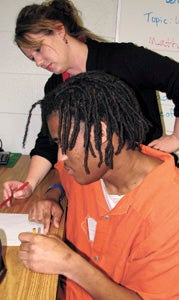Jail becomes learning environment
Published 10:13 pm Friday, March 1, 2013
Suffolk Public Schools teacher Marie Evans questioned her students about attitude and the effects it can have in the workplace.
“Can you tell someone’s attitude by looking at them?” she asked the students.

Marie Evans, a teacher at Western Tidewater Regional Jail, goes over Demetrius Bazemore’s essay on friends. Evans offers daily lessons to inmates at the jail who are under age 22.
The answers come flying: “Sometimes.” “For the most part.”
“What are the effects of a good attitude in the workplace?”
More answers from the students: Raises. Promotions. Bigger tips.
In line with the discussion, Evans turns to talking about her own job. “It’s a great place to work,” she said. “I enjoy coming here and enjoy my students.”
Though she’s employed by Suffolk Public Schools, Evans doesn’t report to a school building for work each day. She goes to Western Tidewater Regional Jail, where she oversees a federally mandated program that provides services to inmates under age 22 who had an individualized education program while in school.
Her classes cover academic, social and vocational skills. Students set individual goals to achieve, usually obtaining their General Educational Development (GED) or getting a Career Readiness Certificate.
“I didn’t have nothing until I came here,” student Benjamin Copeland said recently while taking a break from a writing exercise. “I never really easily focused on anything. The one-on-one stuff helps me a whole lot better than actual school.”
Copeland recently earned his GED and a Career Readiness Certificate, as did fellow student DeAndre Sawyer.
“It gets every student prepared for what they need to do,” said Sawyer, who has offered to tutor other inmates and wants to become a dental assistant when he gets out. “It gets me prepared for when I’m back on the street.”
Copeland said he wants to be a car mechanic when he gets out and is prepared to start a new life.
“I’ve learned I don’t need to do what I was doing when I was out,” he said. “(Getting my GED) felt really good because I’ve never really accomplished anything in my life. Now that’s one accomplishment I do have.”
Though the school system is required to provide the service, eligible inmates are not required to participate. Every student is there by choice.
“Everybody that’s here is coming because they want to improve themselves,” Evans said. “I really try to get the young people to come to class.”
Though some of her students may be there only for a short period of time, Evans works with each one to identify weaknesses to improve. For those working toward a GED, there is a “Study Buddy” handheld system that has the entire GED curriculum on it. There’s also a computer program that helps students work on academic weaknesses. Small classes allow her to devote personal attention.
“Sometimes they’ll resist a certain method of delivery, but I encourage them to do it even though it’s not their favorite, because I know it will work for them,” Evans said.
Before coming to the jail four years ago, Evans was a transition specialist at Lakeland High School, helping prepare students for whatever came after high school.
“It was a natural thing coming here, because my job here is to prepare them for when they get out,” she said.
Readiness for the workplace is a vital part of her lessons at the jail, hence the session on attitude recently.
“We all have traits about ourselves that probably aren’t best displayed in the workplace,” Evans said while seated at her desk in the small classroom. “Your attitude can be more important than your skills.”
Ronnie Sharpe, the education director at the jail, said the program has an excellent success rate. Since Evans came, he can recall only two inmates who returned after leaving the facility.
“We think it’s very important, because without it, the choices are limited,” he said. “They view it as, ‘I don’t have any opportunities other than criminal ones.’”






